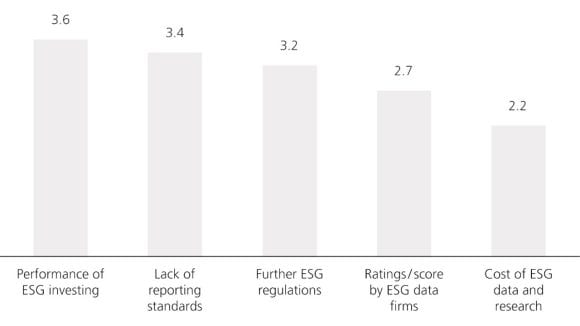Transparency revolution
The convergence of standards underestimated
Author: Andrew Lee, Head Sustainable and Impact Investing, UBS Global Wealth Management
We think the market underestimates how fast standards are converging. The arms race in competing standards has ended in a truce and collaboration called for by investors and regulators. Transposing these to accounting standards is the key focus now. Better quality, more material and more comparable sustainability data is around the corner, which will help inform investment decisions.
Investors both institutional and individual increasingly recognize the materiality of sustainability factors for financial performance. This dynamic, together with growing investor desire to understand and improve the long-term outcomes resulting from investments, continues to drive sustainable investing into the mainstream. We see this clearly reflected in client activity and survey responses, and is further reaffirmed by investment focused industry publications such as the CFA Institute’s recent paper “Future of Sustainability in Investment Management: From Ideas to Reality". But good decision making requires corporate sustainability data that is relevant, high-quality and comparable.
We aren’t there yet, but we can see the emergence of a global standard for sustainability data that will complete the picture and help mobilize more capital to be invested sustainably.
Institutional investor views on what the market sees as key issues affecting overall ESG data / service adoption
Institutional investor views on what the market sees as key issues affecting overall ESG data / service adoption
Change is underway
Change is underway
Until recently, sustainability standard setting organizations competed with each other instead of cooperating. But recently the key organizations in the world of sustainability standards have gotten together to form a common approach. We believe this will prove revolutionary in the years ahead.
What is happening now that will change the dynamic? First, standards are coalescing around the efforts of the Sustainable Accounting Standards Board (the SASB) to define materiality and accounting rules for sustainability data. Hundreds of public companies are already using these standards to communicate financially material sustainability information to investors. Furthermore, the standard setting world, including the SASB, the Global Reporting Initiative, the Carbon Disclosure Project, the International Integrated Reporting Council (the IIRC) and the Climate Disclosure Standards Board, aligned around a common framework last September. Meanwhile, the SASB is merging with the IIRC, combining the two most influential of these organizations into one.
Second, the International Financial Reporting Standards Foundation (the IFRS Foundation) has begun to standardize accounting rules for sustainability data outside the US. The process of global standardization has just kicked off, but we see a historical parallel: in 2003 the US-based Financial Accounting Standards Board and the International Accounting Standards Board agreed to harmonize financial reporting in a historic agreement that aligned global accounting.
We see a path toward a straight forward set of reporting rules that can be adopted around the world, making sustainable investing everyday investing.
What does this mean for investors?
What does this mean for investors?
Agreement on global reporting standards will likely lead to endorsement by the world’s security regulators, making reporting mandatory, similar to material financial data. Regulators in the EU have already laid down the outline of a reporting framework, as well as an approach to climate related disclosure following the recommendations of the Task Force on Climate related Financial Disclosure (the TCFD). The US has lagged with regard to this effort, but there will probably be a catch-up period under a new administration.
In the not too distant future, we see a world where more reliable and comparable sustainability data is reported alongside important climate related and financial data. Investors, big and small, will be able to make better decisions that improve risk and return, and improve their ability to align investments with society’s needs and also better customize to individual preferences. This is a good outcome for the stakeholders that public companies are accountable to.
Potential to mobilize more capital
Potential to mobilize more capital
Progress on these collaborative efforts can, in our view, simplify and elevate sustainability disclosure standards to a level comparable to financial reporting. Investor concerns around the materiality of sustainability issues would ease, and the hope is that additional investment will come from those who have remained on the sidelines so far. The growth of alternative data that augments, corroborates or challenges standardized data could further accelerate mobilization of capital. Greater sustainable investment could benefit a range of social and environmental areas; for example, it could provide the significant capital needed by carbon emitting companies to transition their business models to much more sustainable levels and contribute to addressing climate risk.
Discover other trends
Discover other trends

Investor engagement
More influential than regulation

Impact investing
The next wave of growth

Electric transport
Adoption sooner than expected

Net zero
From aspiration to firm targets

Big Oil
The opportunity for reinvention

Diversity
The destructive potential of prejudice

Plant-based meats
The future of food

Climate stress testing
The transformation of capital allocation

Sustainable data
Insights from new lenses

Want to know more?
To get more insight into sustainable finance in the year to come, download your copy of Sustainable Finance: Ten Trends for 2021.

Interested in more content?
Interested in more content?
Subscribe to our newsletter to receive the latest insights.

